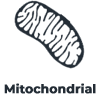Reduced glutathione has a remarkable effect on oxidation throughout the body, and with this in mind it is no surprise that it is one of the main endogenous oxidation regulating compounds throughout the body. One of the main ways in which reduced glutathione supports balanced oxidation levels is by directly neutralizing reactive oxygen species (ROS) like superoxide and hydrogen peroxide. When reduced glutathione performs this neutralization reaction with ROS, reduced glutathione itself becomes oxidized, which yields the oxidized form of glutathione known as GSSG. GSSG does not possess the same oxidation regulating effects that reduced glutathione does. In fact, it may even act as a pro-oxidant in some cases. This is why GSSG levels are under strict control of various enzymes and biochemical processes throughout the body that convert GSSG back to reduced glutathione. This mechanism of action also explains why the body contains such large stores of reduced glutathione and why topping off these glutathione stores with supplemented reduced glutathione can help promote ideal oxidative status throughout the body.
Reduced Glutathione and Oxidation-Regulating Vitamin Regeneration
Not only does reduced glutathione directly neutralize ROS via chemical reactions, it also helps balance oxidation levels through a plethora of other pathways. For example, reduced glutathione helps regenerate vitamin E and vitamin C levels in the body. Both of these essential vitamins also have remarkable effects on oxidation, and thus, by regenerating their levels, the oxidation balancing effects of glutathione extend further than you may imagine! Not only does glutathione help regenerate these oxidation-regulating vitamins, it also functions as a cofactor for endogenous oxidation regulating enzymes such as glutathione peroxidase or glutathione-S-transferase.
Reduced Glutathione and Phase II Detoxification
Reduced glutathione also plays a very important role in phase II detoxification in the liver, which also produces an oxidation-balancing effect. Furthermore, reduced glutathione can also mitigate the oxidative stress produced by enzymes in phase I detoxification in the liver. With this in mind, it becomes clear why reduced glutathione is also often discussed in the context of liver health. That's because it plays a large role in the primary function of the liver: detoxification. So, it is also no surprise that one of the largest glutathione stores in the body is located in the liver!
Reduced Glutathione and Inflammation
The oxidation-regulating effects also help regulate inflammation. For example, the ROS hydrogen peroxide, which reduced glutathione directly neutralizes, is a form of ROS that also causes significant inflammation in the body. By neutralizing hydrogen peroxide, we can expect to see both an attenuation of oxidation and inflammation. Another ROS that reduced glutathione attenuates is superoxide, which also causes inflammation secondary to its oxidative properties in the cell that negatively affects the body and needs to be kept under control.
When taken together, it becomes clear that reduced glutathione has a remarkable effect on promoting cellular health. This is because it attenuates two of the main threats to cellular function: oxidative stress and inflammation. Furthermore, its direct detoxification effects solidify this effect on cellular health as it helps protect cells from various stressors; both endogenous (ROS) and exogenous (mercury and persistent organic pollutants). This is an effect that is not really shared by any other oxidation-regulating compounds, and this is one of the aspects of reduced glutathione that really sets it apart from the other oxidation regulating compounds out there! As far as cellular health goes, supplementing reduced glutathione is a no-brainer!









